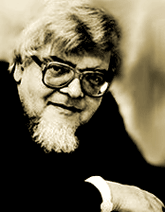John Ogdon, pianist

© unknown
John Andrew Howard Ogdon was born on the 27th of January, 1937, in Mansfield Woodhouse, Nottinghamshire, and died in London on the 1st of August, 1989, at the age of 52. He will undoubtedly be remembered as Britain’s most outstanding pianist, and for his heroic struggle against mental illness that threatened to destroy his career. That he will be remembered in this way is unfortunate, because, a half-truth itself, it obscures more important truths. That John was a pianist of unique abilities is indisputable, but he was more than one country’s “most celebrated pianist”. That he was not uniformly and securely in what most people are pleased to call “right mind” cannot be questioned (although the circumstances surrounding his “illness” and the interpretation that can be put on his actions, both on and off the musical platform, most certainly can).
A brief survey of the milestones (which mark the passage of a man’s life) and the millstones (which serve the dual function of weighing down and grinding down the human spirit) of his truly remarkable career will suffice here.
His father was a very intelligent and caring man, and a certified schizophrenic, institutionalised and then released after effecting a self-cure involving yoga and meditation. John’s musical talents were recognised early, and nurtured by his mother — he played the piano fluently by the age of five, and was composing at nine (an activity which was an essential part of his musical activities throughout his life). At eight he was attending the Royal Northern College of Music in Manchester one day a week for lessons with Richard Hall and Claude Biggs; it was at this time that he first met Ronald Stevenson while the latter was practising the Busoni Piano Concerto, a meeting which held life-long importance for all three. At sixteen he entered the college as a full-time student, studying composition with Thomas Pitfield, and piano with Gordon Green. A grant from the College enabled him to study with the great pianist Egon Petri, (a former pupil of Busoni) in the latter part of 1957. In 1956 he played the Brahms D minor Concerto under Barbirolli. Two years later he performed the Busoni Concerto for the first of many times. In 1960 he made his first appearance at the Royal Festival Hall, London. His first appearance at the Edinburgh Festival was in 1961. Then in 1962, at the age of 25, he was launched securely onto the international stage by winning joint first prize at the Moscow Tchaikovsky Competition.
From this point on his career was meteoric, the individual achievements too numerous to itemise. In the following ten years, he must have played most of the standard, as well as much unfamiliar, piano repertoire. But in the early 1970s the meteor crashed to earth, as disturbing symptoms of the mental illness which, along with its sometimes haphazard treatment, was to be his constant companion throughout the rest of his life, began to manifest themselves. Despite this, he continued to give concerts worldwide and took up a teaching post in America, at the University of Bloomington, Indiana, between 1976 and 1980. His colleagues and students from these years remember him with great affection, and recall his extraordinary musicianship and undiminished stature as man and musician, even as his personal life was traumatized.
In 1984 he made his much-publicised “return to the British concert stage” — the concert in which he played the three sonatas of Chopin, with Liszt’s Dante Sonata as an encore. In the following five years, until his untimely death, he gave concerts increasingly, and made a number of recordings; these included one of the greatest achievements of his career — to perform and record Sorabji’s Opus Clavicembalisticum, which he had known and revered since his teens, and which, in a conversation with Ronald Stevenson, he named among a handful of works that were “really worth playing” (this from “the pianist who played everything”) — along with Chopin’s f-minor Ballade, Busoni’s Fantasia Contrappuntistica, and the Hammerklavier Sonata.
What is it that these works have in common, that might give us, not the key to John’s psyche (that would be an immodest request) but at least a chance to peer through the keyhole? It is surely their visionary quality, their striving to see beyond the known world, to transcend the possible. All of the composers of the works were familiar with what Aldous Huxley called the Antipodes of the mind, and they speak to us directly of their inner journey. But experiences of this kind do not readily admit of descriptions in words, which rely on common experience of their meaning. Music achieves a far more fundamental level of communication — it has been well described as an asemantic language, which can express everything and name nothing. It was this language, the pure language of ideas, unimpeded by linear grammar, in which John, so often tongue-tied and awkward in conversation in his later years, was fluent. Fluent to the point where, carried on the swift counterpoint of thought (in Busoni’s Doktor Faust, Mephistopheles says “I am as swift as are the thoughts of Man” — a dangerous temptation to the artist, always seeking new horizons) he travelled far, and took us as his travelling companions. John’s greatness lay, above all, in his ability to transcend the commonplace. Neither his music-making, nor his thoughts, were commonplace. And if his circumstances were sometimes sordid and ugly, he was not. This gentle and profound man inspired more, and more genuine, love than many who are apparently more at ease with their fellow man. He was a genius. He was a great man. Requiescat in pace.
[Extracted by permission of Altarus Records from the booklet accompanying their 2-CD boxed set “In Memoriam John Ogdon” (AIR-CD-9063[2]).]
